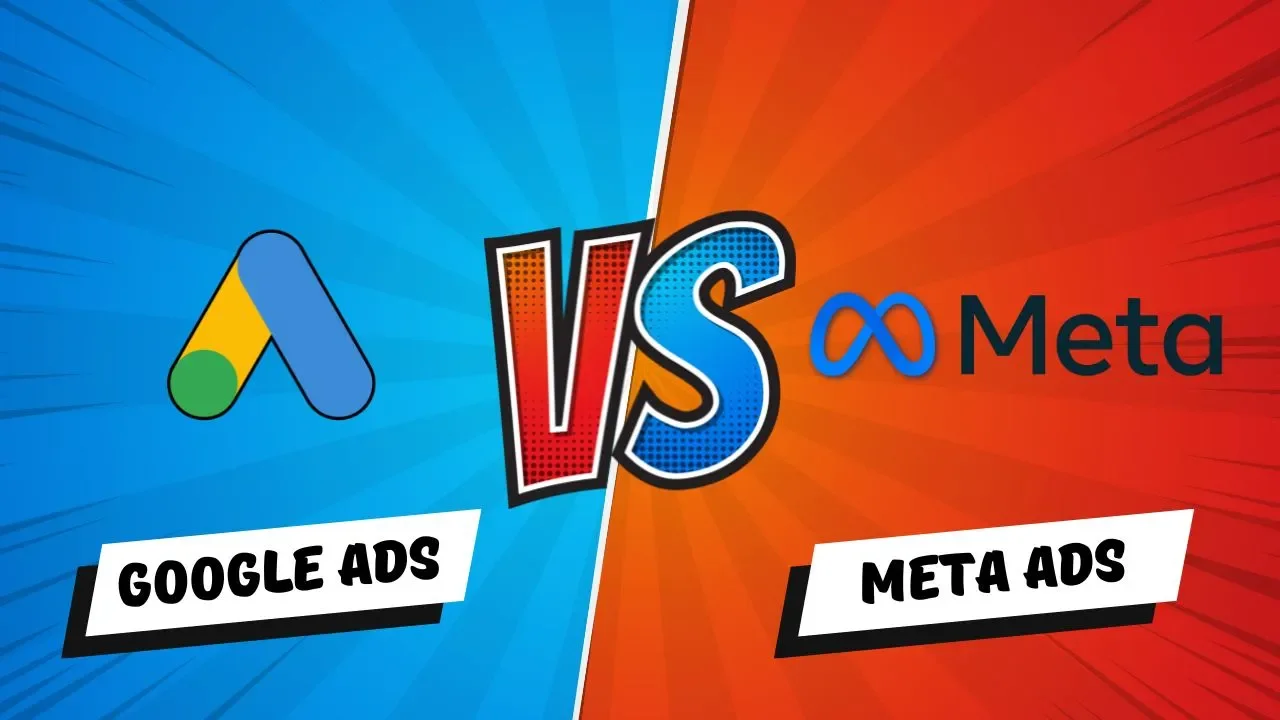In the ever-evolving landscape of digital advertising, choosing the right platform is no longer just a preference—it’s a strategic decision that can determine the success or failure of your marketing campaign. With consumer behavior constantly shifting and online competition growing fiercer by the day, advertisers are under pressure to invest in platforms that deliver real, measurable results. The ongoing debate—Google Ads vs Meta Ads – What Works Best in 2025? has reached a boiling point, as marketers across industries aim to stretch their ad budgets while maximizing ROI.
Google Ads*continues to dominate in search intent, giving businesses the ability to target users actively looking for specific products or services. It’s a powerful tool for driving high-conversion traffic through keyword-focused strategies. In contrast, Meta Ads shines when it comes to social engagement and precise audience targeting. Leveraging advanced AI algorithms, Meta allows advertisers to reach users based on their behavior, interests, and demographics—making it ideal for building brand awareness, nurturing leads, and executing effective retargeting strategies.
So, which platform delivers better results in 2025—Google Ads or Meta Ads? The answer often depends on your goals. For immediate intent-driven conversions, Google is king. For brand storytelling, community building, and retargeting, Meta holds the crown. The smartest marketers often leverage both to dominate the digital space. Let’s dive into how both platforms are performing in 2025 and which one might be the best fit for your marketing goals. To know more about their features, trends, and audience reach, [click here].
The Rise of Smarter Advertising Platforms
In 2025, both Google and Meta have made major advancements in their advertising technologies, fueled by the rapid evolution of AI and machine learning. These innovations have enhanced targeting accuracy, automated campaign optimization, and improved overall ad performance. However, when evaluating What Performs Better in 2025: Google Ads or Meta Ads?, there isn’t a one-size-fits-all answer. The effectiveness of each platform depends largely on your specific marketing goals, audience, and how strategically you use each tool.
Google Ads is unmatched for capturing high-intent search traffic—perfect for driving direct conversions through paid search and shopping ads. Meta Ads, on the other hand, is exceptional at building brand awareness, driving engagement, and reaching highly segmented audiences through visually driven content on Facebook and Instagram. Success in digital advertising today often comes down to aligning platform strengths with campaign objectives. For many brands, integrating both platforms creates the most balanced and profitable strategy.
Google Ads uses enhanced search and display network algorithms to serve intent-based ads.

By focusing on user behavior, interests, and detailed demographics, Meta Ads enable highly targeted campaigns that resonate with the right audience at the right time. These ads are seamlessly integrated across Meta’s vast network, including Facebook, Instagram, and WhatsApp, making it easier to build brand awareness and drive meaningful engagement.
Audience Targeting: Intent vs. Interest
Understanding the core difference in targeting is essential when deciding what performs better in 2025:Google Ads vs Meta Ads. Each platform serves a distinct purpose in the customer journey, and choosing the right one depends heavily on how your audience behaves. Google Ads taps into intent-based marketing reaching users who are actively searching for specific products, services, or solutions. It’s ideal for capturing demand at the exact moment someone is ready to take action.
On the other hand, Meta Ads (Facebook and Instagram) focus on interest-based and behavioral targeting, helping users discover your brand while they’re casually scrolling or engaging with content. This makes Meta powerful for building awareness, nurturing interest, and retargeting. In 2025, a winning ad strategy often combines both platforms to guide users from awareness to conversion. Want to know which one suits your business best or how to integrate both effectively? Just contact me for expert guidance.
Google Ads perform best when users are actively searching for a specific product or service—making them ideal for high-intent targeting.
If your goal is to drive immediate conversions from customers who are actively searching for products or services, Google Add is likely your best choice. Its search-based targeting reaches users with strong purchase intent, making it ideal for direct response campaigns.
However, if you’re focused on building brand awareness, fostering engagement, or promoting lifestyle-oriented products, Meta Ads may be the more effective platform. With visually engaging formats and advanced audience targeting, Meta excels at storytelling and nurturing long-term customer relationships through its social media channels.
Ad Formats and Creative Flexibility
In 2025, both platforms offer advanced creative options, but with different strengths.
- Google Ads now features responsive search ads, shopping ads, and immersive YouTube video formats.
- Meta Ads dominate the visual storytelling game with short-form Reels, carousels, and interactive Stories.
So when evaluating What Performs Better in 2025: Google Ads vs Meta Ads, ask yourself: Is your campaign text-focused or visually rich?
Cost and ROI: Where’s the Budget Going Further?
In 2025, advertisers are more cost-conscious than ever, aiming to stretch their budgets without sacrificing performance. While ad costs continue to fluctuate depending on industry, audience size, and competition, a financial comparison of What Performs Better in 2025: Google Ads vs Meta Ads, reveals distinct differences. Google Ads often comes with a higher cost-per-click (CPC), especially in competitive niches, due to its intent-driven targeting and high conversion potential.
Meta Ads, on the other hand, generally offers a lower CPC, making it a cost-effective choice for campaigns focused on reach, engagement, and brand visibility. Choosing the right platform depends on your ROI priorities. To know more about Cost and ROI: Where’s the Budget Going Further?, [click here].
Advertisers are more cost-conscious than ever. While ad costs fluctuate based on industry and demand, comparing What Performs Better in 2025: Google Ads vs Meta Ads, financially reveals:
- Meta Ads often have lower CPCs (cost-per-click), making them ideal for startups and awareness campaigns.
- Google Ads tend to have higher CPCs, but they usually generate more qualified leads, resulting in better ROAS (return on ad spend).
Your budget allocation should reflect your funnel stage and business objective.
Performance Analytics and Optimization Tools
- Both platforms now use real-time data dashboards powered by AI insights.
- Google Ads provides deep conversion tracking, keyword analysis, and performance forecasts.
- Meta Ads includes engagement metrics, demographic breakdowns, and creative testing tools.
In the context of What Performs Better in 2025: Google Ads vs Meta Ads, both platforms shine in different areas of campaign optimization. Google Ads often leads with its highly detailed, performance-driven analytics that allow advertisers to track every click, conversion, and keyword. Meanwhile, Meta Ads excels in providing rich audience insights, behavioral data, and advanced A/B testing tools making it ideal for refining creative strategies and understanding audience engagement on a deeper level.
Omni-Channel Integration and Retargeting
Marketers in 2025 focus on multi-platform consistency. So which platform supports that better?
- Google Ads seamlessly connects with platforms like Search, YouTube, Gmail, and the Display Network.
- Meta Ads retargets users across Facebook, Instagram, Messenger, and even integrated mobile apps.
Depending on your overall channel mix, the answer to What Performs Better in 2025: Google Ads vs Meta Ads may come down to where your audience spends most of their time online. If your target customers are actively searching for solutions, Google is likely the better fit. However, if they’re more engaged with social content and storytelling, Meta may deliver better results. Choosing the right platform means aligning with your audience’s digital behavior.
Final Verdict What Performs Better in 2025: Google Ads vs Meta Ads

There’s no one-size-fits-all answer when it comes to What Performs Better in 2025: Google Ads vs Meta Ads. The best choice depends on several key factors unique to your business. Consider your campaign objectives, target audience behavior, industry type, and available budget. Evaluate whether you’re aiming for direct conversions, brand awareness, or long-term engagement. Understanding these elements will help you choose the platform that aligns best with your marketing goals.
There’s no one-size-fits-all answer. When choosing between What Performs Better in 2025: Google Ads or Meta Ads?, consider your:
- Audience behavior (searching vs. browsing)
- Content format (text-heavy vs. visual-first)
- Goals (direct sales vs. engagement or awareness)
- Budget (premium leads vs. broad visibility)
Today, most successful brands take a hybrid approach, leveraging both platforms to execute a powerful full-funnel marketing strategy. They use Google Ads to capture high-intent demand through search and shopping campaigns, while Meta Ads are used to generate demand by building awareness, interest, and engagement across social media platforms.
Have questions about choosing the right ad platform for your business? Whether you’re exploring Google Ads, Meta Ads, or a custom strategy for 2025, I’m here to help! Reach out today to get expert guidance on maximizing your ad budget, improving ROI, and staying ahead in the digital marketing game. Let’s connect and grow your brand together!